Search Results
Documents, Intorelable Acts or Coercive Acts »
Original text of the Quartering Act of 1774.
June 2, 1774
An act for the better providing suitable quarters for officers and soldiers in his Majesty’s service in North America.
WHEREAS doubts have been entertained, whether troops can be quartered otherwise than in barracks, in case barracks have been provided sufficient for the quartering of all officers and soldiers within any town, township, city, district, or place, within his Majesty’s dominions in North America: And whereas it may frequently happen, from the situation of such barracks, that, if troops should be quartered therein, …
Intorelable Acts or Coercive Acts, Quartering Act »

The Quartering Act was scheduled to be modified every two years. In 1774 British parliament modified the act which was included in a package of five laws known as The purpose of these laws was to assert its power in the colony as reprisal for the Boston Tea Party protest.
By 1774 the political mood was highly charged and residents were initiating political gatherings and organizations such as the and its leaders, Samuel Adams and James Ottis, were advocating their political views.
The modified law allowed British commanders to choose where …
Featured, Quartering Act, Timeline of British Acts on America »

The first in the series of Quartering acts passed by the British parliament. Also known as the American Mutiny Act, The Quartering Act of 1765 was passed on May 3rd, 1765 and required colonial assemblies to provide housing, food and drink to British troops stationed in their towns with the purpose of improving living conditions and decreasing the cost to the crown. This act was implemented by General Tomas Gage, the commander in chief of North America. Soldiers were to be housed in barracks or empty public buildings and not …
Tea Act »
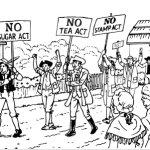
Consequences of the Tea Act
Despite the economic benefit to end consumers of tea, the Tea Act damaged the position of independent shippers, smugglers and local shopkeepers. John Hancock was a well known tea smuggler whose tea inventory was seized by custom officials. Powerful business interest and convinced the population to view the act as another means of as they did not have the freedom to buy tea from other merchants at the same price as from selected official merchants.
Colonists showed their opposition to the Tea Act through the Boston Tea …
British Taxation in Colonial America »
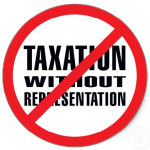
The Navigation Acts were trade rules that governed commerce between Britain and its colonies. The first of the Navigation Acts existed for almost two centuries and was repealed in 1849. The laws were designed to protect British economic interests in colonial trade and to protect its industry against the rapidly growing Dutch navigation trade.
The purpose of the Molasses Act was to protect British West Indies exports to the American colonies from the more fertile French and Spanish islands of Martinique and Santo Domingo. It was not designed to raise revenue …
Townshend Acts »

Chronological events of the Townshend Acts.
Silver coins minted in the 1970’s. Historically, the burning of the Gaspee in 1772 was much removed from a reaction to the Townshend Acts of 1767.
January 1766 – New York refuses to comply with the
August 1766 – Charles Townshend assumed the position of Chancellor of the Exchequer.
June 1767 – had an overwhelming approval in parliament.
July 1767 – King George III signed the bill.
October 1767 – Boston Town Meeting under the leadership of Samuel Adams and James Ottis suggested residents and merchants to voluntarily …
Townshend Acts »
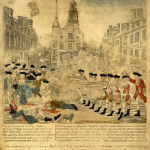
Trade with Great Britain had decreased from £2,378,000 to £1,634,000 by 1769. proved to be a complete failure; it did not increase revenue and confronted the population bringing them close to rebellion. Customs collections did not improve as expected because of the non importation agreement, in addition the cost of the increasing number of colonial military troops was becoming more expensive. Residents in the colonies, especially in Boston, Pennsylvania and New York were almost brought to the point of rebellion while British manufactures and merchants were having a hard …
Featured, Intorelable Acts or Coercive Acts, Timeline of British Acts on America »
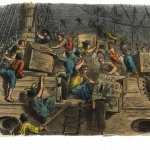
The Intolerable Acts also known as Coercive Acts were a package of five laws implemented by the British government with the purpose of restoring authority in its colonies. The first four Acts were passed as reprisal for the rebellion against the that led to the Boston Tea Party Protest.
The Intolerable Acts were a reprisal to the Boston Tea party rebellion.
The first act was The Boston Port Act which came into effect on March 31, 1774; it closed the port of Boston until the East India Tea company was repaid …
Timeline of British Acts on America, Townshend Acts »
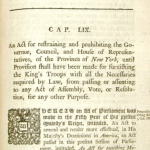
In 1766 Charles Townshend assumed the position of Chancellor of the Exchequer; he was an ally of Grenville and a strong supporter of colonial taxation, and decided to reattempt the collection of funds from British colonies.
In 1767 Townshend proposed a new set of measures known as the Townshend Acts. The Acts were passed in early June with an overwhelming support of parliament, and were to be effective on November 20th. After the the British had to show the colonies that Britain had the right to tax the colonies, raise …
Intorelable Acts or Coercive Acts »
The were a package of five laws implemented by the British government with the purpose of restoring authority in its colonies. The first four Acts were passed as reprisal for the rebellion against the 1773 that led to the Boston Tea Party Protest.
The first act was The Boston Port Act which came into effect on March 31, 1774; it closed the port of Boston until the East India Tea company was repaid for the destroyed tea. All shipping, landing or discharging of goods was prohibited in the area within the …


